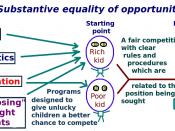Some of life' s most important decisions rely on the concept of justice; however, that idea seems to be a difficult one to define. According to Webster's dictionary, the term justice is the "quality of being just; merited reward or punishment". While this definition may seem abstract, justice must be clearly understood because it plays such an important role in creating the fair society that is so desirable. The many issues of judicial concern that affect that society today, for example the ethical debate between affirmative action and equal opportunity, have intrigued thinkers throughout history as evidenced in Aristotle's Politics: A Definition of Justice.
Aristotle's views of justice are difficult to understand because of the concept of equality and inequality. His definition of justice is "justice seems to be equality but not for everyone, only for equals. Justice is also inequality but only for the unequals." According to Aristotle, justice was a question that focused on the relationship of the state and functioned in either an oligarchy form of government or in a democracy style.
In oligarchy, which is governed by the few, justice rests on inequality where the select few is superior and everyone else is inferior. On the other hand, in a democracy equality is valued and the government is run by the many, where the poor have the same vote as the wealthy. He argues that in a democratic state the wealthy do not necessarily have the largest say and the poor do not have a voice at any of the highest levels, but their concerns are should be equally considered in a well-ordered and justice state. Aristotle says that the interest of the whole is superior to the interest of the individual, thus stating that justice is the key to a happy community. His argument...


